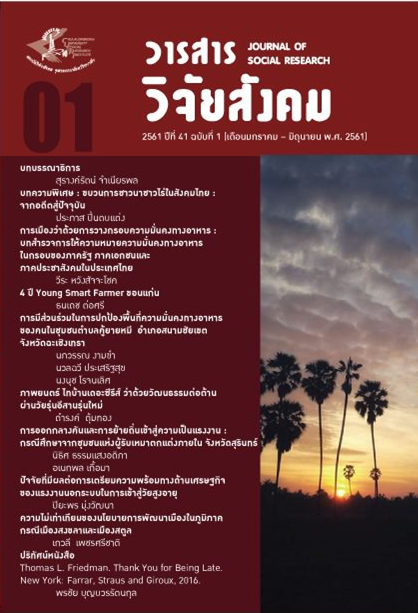การเมืองว่าด้วยการวางกรอบความมั่นคงทางอาหาร : บทสำรวจการให้ความหมายความมั่นคงทางอาหาร ในกรอบของภาครัฐ ภาคเอกชน และภาคประชาสังคมในประเทศไทย
Main Article Content
บทคัดย่อ
ความมั่นคงทางอาหารเป็นแนวคิดสำคัญที่มีปัญหาในการนิยามและวางกรอบในการวิเคราะห์ เนื่องจากมีนิยามมากกว่า 200 นิยามและกว่า 450 ตัวชี้วัด ทำให้การเลือกใช้คำว่า “ความมั่นคงทางอาหาร” กลายเป็นการใช้แนวคิดเชิงยุทธศาสตร์ที่ทุกภาคส่วนอ้างอิง แต่ถูกเลือกใช้และวางกรอบตามเป้าหมายของภาคส่วนของตน งานวิจัยนี้จึงตั้งคำถามว่าภาครัฐ ภาคเอกชน และภาคประชาสังคมของไทย มีกระบวนการให้ความหมายความมั่นคงทางอาหารแตกต่างกันอย่างไร และการให้ความหมายความมั่นคงทางอาหารที่แตกต่างกัน เห็นมิติการเคลื่อนไหวทางการเมืองในการต่อสู้ต่อรองอำนาจและวัตถุประสงค์เบื้องหลังการนิยามที่แตกต่างกันอย่างไร โดยใช้วิธีวิจัยด้วยการสำรวจเอกสาร การสัมภาษณ์เชิงลึก และกรอบการศึกษาวาทกรรมวิเคราะห์เชิงวิพากษ์ เพื่อค้นหาการเมืองและอุดมการณ์ครอบงำที่แฝงอยู่ในการเลือกใช้ภาษาและแนวคิด
งานวิจัยมีข้อค้นพบว่า มีการเมืองในการเลือกหยิบใช้และวางกรอบความมั่นคงทางอาหารของภาครัฐ ภาคเอกชน และภาคประชาสังคม ที่แตกต่างกันไปใน 4 ประเด็นสำคัญ คือ มิติการมองความมั่นคงทางอาหาร หน่วยในการวิเคราะห์ความมั่นคงทางอาหาร เป้าหมายของความมั่นคงทางอาหาร และการใช้อำนาจรูปแบบต่างๆ ในการจัดการความมั่นคงทางอาหารตามจุดยืนของภาคส่วนตน
ผลการศึกษานำมาสู่ข้อเสนอที่ว่าความมั่นคงทางอาหารมีการเมืองในการวางกรอบนิยามตามเป้าหมายและผลประโยชน์ของแต่ละภาคส่วนอย่างปฏิเสธไม่ได้ และหากต้องการสร้างความมั่นคงทางอาหารที่อาศัยความร่วมมือจากทุกภาคส่วน ต้องก้าวข้ามการถกเถียงเชิงแนวคิด แล้วมาเน้นความร่วมมือในเชิงปฏิบัติร่วมกันผ่านหน่วยงานในระดับจังหวัดและชุมชน
Article Details
1) บทความนี้เป็นลิขสิทธิ์ของสถาบันวิจัยสังคม จุฬาลงกรณ์มหาวิทยาลัย แต่ความคิดเห็นและเนื้อหาเป็นของผู้แต่ง
2) ทัศนะและความคิดเห็นที่ปรากฏในบทความในวารสารวิจัยสังคมและปริทัศน์ สถาบันวิจัยสังคม จุฬาลงกรณ์มหาวิทยาลัย ถือเป็นความรับผิดชอบของผู้แต่งบทความนั้น และไม่ถือเป็นทัศนะและความรับผิดชอบของกองบรรณาธิการวารสารวิจัยสังคมและปริทัศน์ สถาบันวิจัยสังคม จุฬาลงกรณ์มหาวิทยาลัย กองบรรณาธิการไม่สงวนสิทธิ์ในการคัดลอก แต่ให้ระบุถึงการอ้างอิง
เอกสารอ้างอิง
1. คณะกรรมการอาหารแห่งชาติ. (2559). กรอบยุทธศาสตร์การจัดการด้านอาหารของประเทศไทย, เข้าถึงได้จาก: http://food.fda. moph.go.th/lgtfdapv/data/Strategy.pdf (วันที่เข้าถึง 12 มีนาคม 2560).
2. ซีพีเอฟ (2558) “รายงานความยั่งยืนประจำปี 2558” บริษัท เจริญโภคภัณฑ์อาหาร จำกัด (มหาชน), เข้าถึงได้จาก: http://www.cpfworldwide.com/th/sustainability/report, (วันที่เข้าถึง 13 มีนาคม 2560).
3. วีระ หวังสัจจะโชค. (2557). ความมั่นคงทางอาหารในอาเซียน: บทสำรวจร่วมสมัย, นนทบุรี: มูลนิธิเกษตรยั่งยืน (ประเทศไทย).
4. วีระ หวังสัจจะโชค. (2559). “ความมั่นคงทางอาหารและอธิปไตยทางอาหาร: การศึกษาการเมืองเรื่องอาหาร (Food Politics) ในศตวรรษที่ 21” วารสารรัฐศาสตร์มหาวิทยาลัยสุโขทัยธรรมา ธิราช. 2,2 (ก.ค.-ธ.ค.): 77-104.
ภาษาอังกฤษ
1. Agarwal, Bina. (2014). “Food Sovereignty, Food Security, and Democratic Choice: Critical Contradictions, Difficult Conciliations” The Journal of Peasant Studies. 41,6: 1247-1268.
2. Boyer, Jefferson. (2010). “Food Security, Food Sovereignty, and Local Challenges for Transnational Agrarian Movements: The Honduras Case” The Journal of Peasant Studies. 37, 2 : 319-351.
3. Chiengkul, Prapimhan. (2015). Hegemony and Counter-Hegemony in the Agri-food System in Thailand (1990-2014). Ph.D. thesis, University of Warwick.
4. Cox, Robert W. (1986) “Social Forces, States and World Orders: Beyond International Relation Theory”, in Robert O. Keohane (ed.) Neoliberalism and Its Critics. New York: Columbia University Press, pp. 204-254.
5. Fairbairn, Madeleine. (2010). “Framing Resistance: International Food Regime and the Roots of Food Sovereignty” in Hannah Wittman, Annette Desmarais and Nettie Wiebe (eds.) Food Sovereignty: Reconnecting Food, Nature, and Community. Oxford: Pambazuka Press. pp. 15-32.
6. Fairclough, Norman. (1995). Critical Discourse Analysis. London: Longman.
7. Fairclough, Norman and Ruth Wodak .(1997). “Critical Discourse Analysis” in Teun A. Van Dijk (ed.) Discourse as Social Interaction, Vol. 2, London: Sage, pp. 258-284.
8. FAO. (1983). World Food Security: A Reappraisal of the Concepts and Approaches. Director-General's Report. Rome.
9. Foucault, Michel. (1980). Power/Knowledge: Selected Interviews and Other Writings, 1972-1977, Colin Gordon, Leo Marshall, John Mepham, and Kate Soper (trans.). New York: Pantheon Books.
10. Friedmann, Harriet. (1982). “The Political Economy of Food: The Rise and Fall of the Postwar International Food Order” American Journal of Sociology, 88, Supplement: S248-S286.
11. Friedmann, Harriet. (1993). “The Political Economy of Food: A Global Crisis” New Left Review, 197: 29-57.
12. Friedmann, Harriet and Philip McMichael. (1989). “Agriculture and the State System: The Rise and Decline of National Agricultures, 1870 to the Present” Sociologia Ruralis, 29, 2 (August): 93-117.
13. Harvey, David. (2005). A Brief History of Neoliberalism. Oxford: Oxford University Press.
14. Hodge, Robert and Gunther Kress. (1993). Language as Ideology. London and New York: Routledge and Kegan Paul.
15. Holt- Giménez, Eric. (2006). Campesino a Campesino: Voices from Latin Maerica’s Farmer to Farmer Movement for Sustainable Agriculture. San Francisco: Food First Books.
16. Holt-Giménez, Eric and Loren Peabody. (2008). “From Food Rebellions to Food Sovereignty: Urgent Call to Fix a Broken Food System” Food First Backgrounder. 14, 1: 1-6.
17. Jarosz, Lucy. (2014). “Comparing Food Security and Food Sovereignty Discourses” Dialogues in Human Geography. 4, 2: 168-181.
18. Maxwell, Simon. (1996). “Food Security: A Post-Modern Perspective” Food Policy, 21,2 : 155-170.
19. McKeown, David. (2006). “Chapter One: Definition of Food Security” in Food Security: Implications for the Early Year. Available: http://www1.toronto.ca /city_of_toronto/torontopublic_health/healthy_public_policy/children/files/pdf/fsbp_ch_1.pdf, (Accessed July 11, 2017)
20. McMichael, Philip. (1992). “Tensions between National and International Control of the World Food Order: Contours of a New Food Regime”. Sociological Perspectives. 35,2 : 343-365.
21. McMichael, Philip. (2000). “Global Food Politics” in Fred Magdoff, John Bellamy Foster, and Frederick H. Buttel (eds.) Hungry for Profit: The Agribusiness Threat to Farmers, Food, and the Environment. New York: Monthly Review Press. pp.125-143.
22. McMichael, Philip. (2009). “A Food Regime Genealogy” Journal of Peasant Studies. 36,1: 139-170.
23. McMichael, Philip and Mindi Schneider. (2011). “Food Security Politics and the Millennium Development Goals”. Third World Quarterly. 32, 1: 119-139.
24. Patel, Raj. (2012). “The Long Green Revolution” The Journal of Peasant Studies. 40,1: 1-63.
25. Rosset, Peter. (2006). Food is Different: Why We Must Get the WTO Out of Agriculture. London and New York: Zed Book.
26. Staples, Amy L. S. (2006). The Birth of Development: How the World Bank, Food and Agriculture Organization and World Health Organization Changed the World, 1945-1965. Kent, Ohio: The Kent State University Press.
27. Taylor, Marcus. (2008). “Introduction”, in Marcus Taylor (ed.) Global Economy Contested: Power and Conflict across the International Division of Labour. London and New York: Routledge. pp.1-8.
28. Tenorio, Encarnacion Hidalgo. (2011) .“Critical Discourse Analysis, An Overview” Nordic Journal of English Studies. 10,1: 183-210.
29. Van Dijk, Teun A. (1993). “Principles of Critical Discourse Analysis” Discourse and Society. 4,2 : 249-283.
30. Van Dijk, Teun A. (1995). “Aims of Critical Discourse Analysis” Japanese Discourse. 1: 17-27.
31. Van Leeuwen, Teun. (2009). “Discourse as the Recontextualization of Social Practice: A Guide” in Ruth Wodak and Michael Meyer (eds.) Methods of Critical Discourse Analysis. London: Sage. pp. 144-161.
32. Wodak, Ruth and Michael Meyer. (2009). “Critical Discourse Analysis: History, Agenda, Theory, and Methodology” in Ruth Wodak and Michael Meyer (eds.) Methods of Critical Discourse Analysis. London: Sage. pp. 1-33.
สัมภาษณ์
1. วิฑูรย์ เลี่ยนจำรูญ. 16 มกราคม 2559. สัมภาษณ์
2. เดชรัต สุขกำเนิด. 16 มกราคม 2559. สัมภาษณ์.
3. อภิชาติ พงษ์ศรีหดุลชัย. 22 พฤษภาคม 2560. สัมภาษณ์.
4. วุฒิชัย สิทธิปรีดานันท์. 22 พฤษภาคม 2560. สัมภาษณ์.


